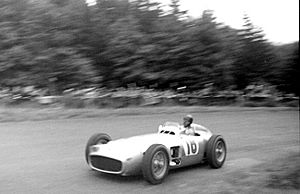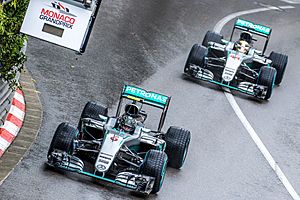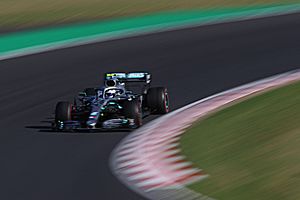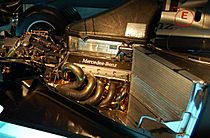Mercedes-Benz in Formula One facts for kids
 |
|
| Full name | Mercedes-AMG Petronas F1 Team |
|---|---|
| Base | Stuttgart, Baden-Württemberg, Germany (1954–1955) Brackley, England (2010–present) |
| Team principal(s) | Toto Wolff (Team Principal & CEO) |
| Technical Director | James Allison |
| Previous name | Brawn GP |
| Formula One World Championship career | |
| First entry | 1954 French Grand Prix |
| Last entry | 2025 Singapore Grand Prix |
| Races entered | 227 |
| Engines | Mercedes |
| Constructors' Championships |
8 (2014, 2015, 2016, 2017, 2018, 2019, 2020, 2021) |
| Drivers' Championships |
9 (1954, 1955, 2014, 2015, 2016, 2017, 2018, 2019, 2020) |
| Race victories | 115 |
| Podiums | 236 |
| Points | 5685 (5824.14) |
| Pole positions | 127 |
| Fastest laps | 84 |
| 2024 position | 4th (468 pts) |
| Formula One World Championship career | |
|---|---|
| First entry | 1954 French Grand Prix |
| Last entry | 2025 Singapore Grand Prix |
| Races entered | 499 (497 starts) |
| Chassis | Mercedes, Sauber, McLaren, Brawn, Force India, Williams, Lotus, Manor, Aston Martin |
| Constructors' Championships | 11 (1998, 2009, 2014, 2015, 2016, 2017, 2018, 2019, 2020, 2021, 2024) |
| Drivers' Championships |
13 (1954, 1955, 1998, 1999, 2008, 2009, 2014, 2015, 2016, 2017, 2018, 2019, 2020) |
| Race victories | 201 |
| Podiums | 504 |
| Points | 10891 (11030.14) |
| Pole positions | 210 |
| Fastest laps | 179 |
Mercedes-Benz, a famous German car brand, has been a big part of Formula One racing for many years. They have been both a team owner and an engine maker since 1954. The team you see today, called Mercedes-AMG Petronas F1 Team, is based in Brackley, England. They race under a German racing licence.
In December 2020, it was announced that Ineos would become a part-owner of the team. This happened on January 25, 2022. Mercedes teams are often called the "Silver Arrows" (which means Silberpfeile in German). This nickname comes from their shiny silver cars.
Before World War II, Mercedes-Benz won three titles in the European Championship. They first joined Formula One in 1954. Their driver, Juan Manuel Fangio, won their first race at the 1954 French Grand Prix. He then won three more races to become the 1954 Drivers' Champion. He won again in 1955. Even with two championships, Mercedes-Benz left motor racing after 1955. This was because of a very sad accident at the Le Mans race that year.
Mercedes came back to Formula One in 1994 as an engine supplier. They worked with Ilmor, a British company that made their engines. They won one team championship and three driver championships with McLaren until 2009. In 2005, Ilmor changed its name to Mercedes AMG High Performance Powertrains. In 2010, Mercedes bought the Brawn GP team and renamed it Mercedes.
Since 2014, when new rules brought in turbo and hybrid engines, Mercedes has been one of the most successful teams ever. They won seven straight Drivers' titles from 2014 to 2020. They also won eight straight Constructors' (team) titles from 2014 to 2021. Both of these are records! As an engine supplier, Mercedes has won over 200 races. They are the second-best engine supplier in Formula One history. Their engines have helped win 11 team championships and 13 driver championships.
Contents
Mercedes as a Racing Team
Early Grand Prix Racing (1930s)
Mercedes-Benz raced in Grand Prix motor racing in the 1930s. Their "Silver Arrows" cars were very strong, along with their rivals, Auto Union. These teams received a lot of money from the government at the time. They won all the European Grand Prix Championships after 1934. Rudolf Caracciola won three of these for Mercedes-Benz.
Daimler-Benz AG (1954–1955)
In 1954, Mercedes-Benz returned to racing, now called Formula One. They were led by Alfred Neubauer. Their car, the Mercedes-Benz W196, was very advanced. It could be raced with open wheels or with a sleek, covered design.
Juan Manuel Fangio, who was the 1951 champion, joined Mercedes-Benz for their first race. This was the French Grand Prix on July 4, 1954. The team won right away, with Fangio and Karl Kling finishing first and second. Fangio won three more races in 1954 and became the champion.
Their success continued in the 1955 season. Mercedes-Benz kept making their W196 car better. Fangio won four races, and his new teammate Stirling Moss won the British Grand Prix. Fangio and Moss finished first and second in the championship that year.
However, a terrible accident happened at the 24 Hours of Le Mans race on June 11, 1955. A Mercedes-Benz sportscar driver and over 80 fans died. Because of this, several Grand Prix races were cancelled. At the end of the season, the team decided to leave motor sport, including Formula One. During this first time in Formula One, Mercedes won 9 races. Three of these were won by their special "Type Monza" car, which had covered wheels. These are the only three races in Formula One history won by a car with covered wheels.
Mercedes-AMG Petronas Formula One Team (2010–Present)
Before the 2010 season, Mercedes-Benz's main company, Daimler AG, bought a part of the Brawn GP team. This happened on November 16, 2009. After this, and a deal with Petronas, the team was renamed Mercedes GP Petronas Formula One Team. Mercedes was now racing in the team championship for the first time.
Ross Brawn stayed as the team boss. The team kept its base and workers in Brackley, England. This place is near the Mercedes-Benz Formula One engine factory in Brixworth.
The team has an interesting past. It can be traced back to the Tyrrell Racing team from 1970. That team was bought and became British American Racing (BAR) in 1999. BAR then became Honda Racing F1 Team in 2006. In 2008, Honda left, and the team was bought by its managers. They named it Brawn GP after team boss Ross Brawn.
Brawn GP used engines from Mercedes-Benz High Performance Engines. Even with a small budget, Jenson Button won six of the first seven races in 2009. He won the Drivers' Championship, and Brawn GP won the Constructors' Championship. This was the first time a team won both titles in its very first season!
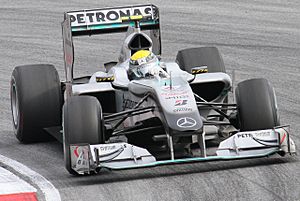
The Mercedes GP team hired German drivers Nico Rosberg and seven-time world champion Michael Schumacher. Schumacher returned to Formula One after three years away. Nick Heidfeld was the test driver. The team's performance in 2010 was not as good as Brawn GP's. They were behind the top teams like Ferrari, McLaren, and Red Bull.
Rosberg got on the podium three times, finishing third in Malaysia, China, and Great Britain. He finished seventh overall. Schumacher had a tough return. He did not win any races, get on the podium, or get a pole position for the first time since his first season in 1991. The team finished fourth in the Constructors' Championship with 214 points.
In February 2011, Daimler bought the rest of the team. With their new MGP W02 car, the Australian Grand Prix race ended with both Schumacher and Rosberg crashing out. In China, Rosberg finished fifth and led 14 laps. Schumacher finished eighth. Rosberg got another fifth place in Turkey. In Spain, Schumacher finished sixth, ahead of Rosberg.
Schumacher finished fourth in Canada, his best result for the team. Rosberg finished seventh in Valencia. In Belgium, Schumacher started from the back but finished fifth. Rosberg finished sixth. The team finished fourth in the Constructors' Championship again, with 165 points. They had no wins, podiums, or pole positions that year.
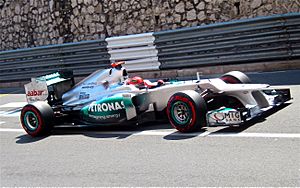
For 2012, the team added "AMG" to its name, becoming Mercedes AMG Petronas F1 Team. At the start of the season, there was a protest about their car's "radical" rear wing. This was settled at the third race in China, and the wing was allowed.
At the third race in China, Rosberg got the team's first pole position since Fangio in 1955. Schumacher started second. The team won its first race in 57 years when Nico Rosberg finished first in China. This was also the first win for a German driver in a German car in Formula 1 history. At the 2012 Monaco Grand Prix, Michael Schumacher was fastest in qualifying. But he started sixth because of a penalty from the previous race.
On September 28, 2012, it was announced that McLaren driver Lewis Hamilton would join Mercedes from the 2013 season. He signed a three-year deal to race alongside Nico Rosberg. In January 2013, Toto Wolff became an executive director of the team. He also bought 30% of the team.
On May 26, 2013, Nico Rosberg won the Monaco Grand Prix from pole position. This was the team's first win of 2013. Paddy Lowe joined the team as executive director on June 3, 2013. Hamilton then got third place in Canada. Rosberg won again at the British Grand Prix. The team then got its third win of the season when Hamilton won his first race for them at the Hungarian Grand Prix. They finished second behind Red Bull Racing in the Constructors' Championship.
Eight Consecutive Team Titles (2014–2021)
Both drivers, Hamilton and Rosberg, stayed for 2014. Rosberg won the first race in Australia. In Malaysia, Hamilton led every lap from pole position and got the fastest lap. Rosberg finished second, giving the team a 1-2 finish. This was Mercedes's first 1-2 finish as a factory team since the 1955 Italian Grand Prix.
The team repeated this 1-2 result in Bahrain, China, and Spain. Rosberg and Hamilton finished 1-2 in Monaco and Austria. At the German Grand Prix race, Rosberg became the first German driver in a German car to win the German Grand Prix since 1939. At the Russian Grand Prix, the team won their first Constructors' Championship as a factory team. Hamilton won the last race in Abu Dhabi. He finished 67 points ahead of Rosberg and won the World Drivers' Championship. The team finished 2014 with a huge lead over Red Bull Racing. They had 18 pole positions, 16 wins, and 11 1-2 finishes out of 19 races. Mercedes was incredibly dominant in this first year of the new V6 turbo engines.
For the 2015 season, Hamilton and Rosberg stayed. At the 2015 Russian Grand Prix, the team won their second Constructors' Championship. Hamilton won his second straight Drivers' Championship at the 2015 United States Grand Prix. Mercedes continued to dominate, getting 18 pole positions, 16 wins, and 12 1-2 finishes in 19 races.
In the 2016 season, Mercedes won the Constructors' Championship for the third year in a row. They won 19 of the 21 races and got 20 pole positions. Rosberg won his only Drivers' Championship, finishing 5 points ahead of Hamilton. He then announced he was retiring shortly after winning the title.
On January 10, 2017, Mercedes announced that Paddy Lowe had left the team. On January 16, 2017, Valtteri Bottas was announced as Rosberg's replacement for the 2017 season. George Russell joined the junior team. On October 22, 2017, Mercedes won the Constructors' Championship for the fourth time in a row. A week later, Lewis Hamilton became the first British driver to win four world championships. Mercedes finished 2017 with 12 wins, 15 poles, and 4 1-2 finishes.
For the 2018 season, Hamilton and Bottas stayed. The team won their fifth straight constructors' title at the 2018 Brazilian Grand Prix. In 2018, Mercedes won 11 races (all by Hamilton). They also got 13 pole positions and four 1-2 finishes. This made Mercedes only the second team in F1 history to win 5 driver and constructor titles in a row. Ferrari did this between 2000 and 2004.
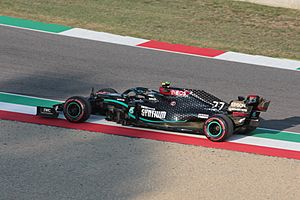
For the 2019 season, Hamilton and Bottas stayed again. In the first race in Australia, Hamilton got pole position. Bottas passed Hamilton at the start and won his first race since 2017. Hamilton finished second, giving the team a 1-2 finish. The team continued to perform strongly. By the summer break, Mercedes had won 10 of 12 races. Hamilton won 8, and Bottas won 2. They had 1-2 finishes in the first 5 races. The team went on to win both the driver and constructor titles for the sixth year in a row.
The team showed their "Dual-Axis-Steering" system during testing for the 2020 season. This system allowed the driver to change the angle of the front wheels by pushing or pulling the steering wheel. This helped warm the tires on straight parts of the track or get better grip in corners. The system was allowed for 2020 but was made illegal for 2021. The team won both the driver and constructor championships that year. Before the second-to-last race, the 2020 Sakhir Grand Prix, Hamilton could not race because he tested positive for a virus. George Russell from the Williams team replaced him.
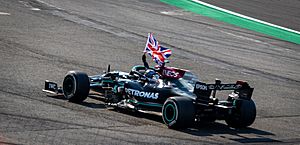
For 2021, the team kept the same drivers for the fifth year. The team did not win the drivers' championship for the first time in the hybrid engine era. Hamilton was passed by Max Verstappen on the last lap of the final race, the Abu Dhabi Grand Prix. This happened after a safety car period that caused some debate. Hamilton had been leading the race and was set to win his eighth title. The team did win the constructors' title for a record-breaking eighth year in a row.
Challenges with Ground Effect (2022–2024)
George Russell joined Hamilton for 2022. This year brought big rule changes, bringing back a car design called "ground effect". Mercedes showed a new car design with very small side pods. This design did not work as well as they hoped. The car also bounced a lot, which is called "porpoising". This bouncing was mostly fixed before the Canadian Grand Prix.
Even with performance issues, Mercedes cars were very reliable. They only had three retirements all season. The team often finished on the podium. At the French Grand Prix, Hamilton finished second and Russell finished third. This was their first double podium of the season. Russell got his first ever pole position at the Hungarian Grand Prix. Russell also won his first Formula One race at the São Paulo Grand Prix, with Hamilton finishing second.
Mercedes finished the 2022 season third in the Constructors' Championship. Russell finished fourth in the Drivers' Championship. Hamilton finished sixth, which was the first time in his career he was outside the top 5. It was also the first season Hamilton did not get a pole position or a Grand Prix win.
The team continued to struggle with their car design in the 2023 season. Mercedes decided to change their Technical Director. James Allison took over from Mike Elliott on April 21, 2023.
Mercedes finished 2023 second in the Constructors' Championship. However, the team did not win a single race for the first time since 2011. Hamilton came closest at the United States Grand Prix, finishing very close behind Max Verstappen. But he was later disqualified. Hamilton finished third in the Drivers' Championship with 6 podiums. He broke a record by getting his 9th pole position at the Hungaroring. Russell had a difficult season, finishing eighth with 2 podiums.
The team has said their W15 car for the 2024 season has a completely different design. They hope to catch up to Red Bull and fight for wins and the championship.
Getting Ready for a New Era (2025–Present)
On February 1, 2024, Mercedes confirmed that Hamilton would leave the team after 12 years. He signed a contract to drive for Ferrari from 2025. On August 31, 2024, Mercedes announced that their junior driver Andrea Kimi Antonelli would replace him. On December 19, 2024, Bottas was announced to be rejoining the team as a reserve driver.
Engine Supplier Role
Mercedes-Benz returned to Formula One as an engine supplier in 1994. They worked with Ilmor, a British company that makes high-performance engines in Brixworth. After Mercedes bought Ilmor, the company is now called Mercedes AMG High Performance Powertrains.
They supplied engines to Sauber for one season. Then, they started a very successful 20-year partnership with McLaren in 1995. In 2009, Mercedes also began supplying engines to Brawn GP (which later became the Mercedes factory team) and Force India (now Aston Martin F1). In 2014, Williams also started using Mercedes engines. The long partnership with McLaren ended before the 2015 season but started again in 2021. Mercedes also supplied engines to Lotus F1 Team in 2015 and Manor in 2016.
For the 2024 season, Mercedes supplies engines to Aston Martin F1, McLaren, and Williams, in addition to their own team.
Junior Driver Program
The Mercedes junior team helps young drivers develop their skills. Many drivers have been part of this program.
Current Junior Drivers
 Alex Powell (joined 2019)
Alex Powell (joined 2019) Yuanpu Cui (joined 2021)
Yuanpu Cui (joined 2021) Luna Fluxá (joined 2022)
Luna Fluxá (joined 2022) Kenzo Craigie (joined 2023)
Kenzo Craigie (joined 2023) Doriane Pin (joined 2024)
Doriane Pin (joined 2024) James Anagnostiadis (joined 2024)
James Anagnostiadis (joined 2024) Rashid Al Dhaheri (joined 2025)
Rashid Al Dhaheri (joined 2025) Andy Consani (joined 2025)
Andy Consani (joined 2025) Ethan Jeff-Hall (joined 2025)
Ethan Jeff-Hall (joined 2025) Julia Montlaur (joined 2025)
Julia Montlaur (joined 2025) Many Nuvolini (joined 2025)
Many Nuvolini (joined 2025) Noah Strømsted (joined 2025)
Noah Strømsted (joined 2025)
Former Junior Drivers
Seven drivers have left the Mercedes junior team. Four of them have raced in Formula One. As of 2025, George Russell and Andrea Kimi Antonelli are the only ones who have driven for the Mercedes F1 team itself. Esteban Ocon is the only other former junior driver racing in the 2025 season.
 Pascal Wehrlein (2014–2018)
Pascal Wehrlein (2014–2018) Esteban Ocon (2015–2019)
Esteban Ocon (2015–2019) George Russell (2017–2021)
George Russell (2017–2021) Paul Aron (2019–2023)
Paul Aron (2019–2023) Daniel Guinchard (2022)
Daniel Guinchard (2022) Andrea Kimi Antonelli (2018–2024)
Andrea Kimi Antonelli (2018–2024) Frederik Vesti (2021–2024)
Frederik Vesti (2021–2024)
Team Sponsors
In December 2009, the team had a problem with a planned sponsorship deal. It was found that a deal signed by the previous Brawn GP team was not valid. The company involved said they knew nothing about it. This issue was resolved later that month.
On December 21, the team announced that Petronas, a big oil and gas company from Malaysia, would be their main sponsor. The team would be called Mercedes GP Petronas Formula One Team from 2010. This deal was reportedly worth a lot of money each year. On September 28, 2022, Mercedes and Petronas announced they would continue their partnership for many more years, starting from the 2026 season.
On January 25, 2010, the team's car colors were shown at the Mercedes-Benz Museum. Schumacher and Rosberg were there. The cars race in the traditional silver colors of Mercedes-Benz. In 2013, the team signed a deal with mobile company BlackBerry, which ended after 2015. Other major partners have included Monster Energy, Puma, Qualcomm, UBS, Epson, Bose, and Hugo Boss. In 2018, Tommy Hilfiger became the team's clothing supplier.
For 2019, the team partnered with CrowdStrike and Marriott Bonvoy. For the 2020 Formula One World Championship, Ineos and AMD joined as partners. In 2021, the team signed a sponsorship deal with TeamViewer, a German technology company.
In 2025, Adidas took over from Tommy Hilfiger as the team's clothing supplier.
Past Sponsorship Issues
The Mercedes F1 team had partnered with FTX, a cryptocurrency company. Mercedes stopped this deal before the 2022 São Paulo Grand Prix because FTX was having money problems. FTX later went bankrupt. A lawsuit was filed against Mercedes F1 team in November 2023 for promoting FTX.
On December 1, 2021, the team signed a sponsorship deal with the Kingspan Group. This caused controversy because Kingspan was being looked into for its role in the Grenfell Tower fire in 2017, where many people died. People who survived the fire and families of victims criticized the deal. Mercedes F1 team boss, Toto Wolff, even offered to meet with the survivors. On December 8, 2021, the deal between Kingspan and Mercedes F1 Team was ended right away.
Racing Achievements
- Team Championships won: 53.3%
- Driver Championships won: 52.9%
- Winning percentage: 50.7%
(Bold means championships won.)
| Year | Name | Car | Engine | Tyres | No. | Drivers | Points | WCC | ||||||||||||||||||||
|---|---|---|---|---|---|---|---|---|---|---|---|---|---|---|---|---|---|---|---|---|---|---|---|---|---|---|---|---|
| 1954 | W196 | M196 2.5 L8 | C | N/A | N/A | |||||||||||||||||||||||
| 1955 | W196 | M196 2.5 L8 | C | N/A | N/A | |||||||||||||||||||||||
| 1956 – 2009: Mercedes-Benz did not compete as a constructor. | ||||||||||||||||||||||||||||
| 2010 | MGP W01 | FO 108X 2.4 V8 | B | 3. 4. |
214 | 4th | ||||||||||||||||||||||
| 2011 | MGP W02 | FO 108Y 2.4 V8 | P | 7. 8. |
165 | 4th | ||||||||||||||||||||||
| 2012 | F1 W03 | FO 108Z 2.4 V8 | P | 7. 8. |
142 | 5th | ||||||||||||||||||||||
| 2013 | F1 W04 | FO 108F 2.4 V8 | P | 9. 10. |
360 | 2nd | ||||||||||||||||||||||
| 2014 | F1 W05 Hybrid | PU106A Hybrid 1.6 V6 t | P | 6. 44. |
701 | 1st | ||||||||||||||||||||||
| 2015 | F1 W06 Hybrid | PU106B Hybrid 1.6 V6 t | P | 6. 44. |
703 | 1st | ||||||||||||||||||||||
| 2016 | F1 W07 Hybrid | PU106C Hybrid 1.6 V6 t | P | 6. 44. |
765 | 1st | ||||||||||||||||||||||
| 2017 | F1 W08 EQ Power+ | M08 EQ Power+ 1.6 V6 t | P | 44. 77. |
668 | 1st | ||||||||||||||||||||||
| 2018 | F1 W09 EQ Power+ | M09 EQ Power+ 1.6 V6 t | P | 44. 77. |
655 | 1st | ||||||||||||||||||||||
| 2019 | F1 W10 EQ Power+ | M10 EQ Power+ 1.6 V6 t | P | 44. 77. |
739 | 1st | ||||||||||||||||||||||
| 2020 | F1 W11 EQ Performance | M11 EQ Performance 1.6 V6 t | P | 44. 63. 77. |
573 | 1st | ||||||||||||||||||||||
| 2021 | F1 W12 E Performance | M12 E Performance 1.6 V6 t | P | 44. 77. |
613.5 | 1st | ||||||||||||||||||||||
| 2022 | F1 W13 E Performance | M13 E Performance 1.6 V6 t | P | 44. 63. |
515 | 3rd | ||||||||||||||||||||||
| 2023 | F1 W14 E Performance | M14 E Performance 1.6 V6 t | P | 44. 63. |
409 | 2nd | ||||||||||||||||||||||
| 2024 | F1 W15 E Performance | M15 E Performance 1.6 V6 t | P | 44. 63. |
468 | 4th | ||||||||||||||||||||||
| 2025 | F1 W16 E Performance | M16 E Performance 1.6 V6 t | P | 12. 63. |
573* | 1st* | ||||||||||||||||||||||
| Source: | ||||||||||||||||||||||||||||
* Season still in progress.
Drivers' Champions
These drivers won the Formula One Drivers' Championship while racing for Mercedes:
 Juan Manuel Fangio (1954, 1955)
Juan Manuel Fangio (1954, 1955) Lewis Hamilton (2014, 2015, 2017, 2018, 2019, 2020)
Lewis Hamilton (2014, 2015, 2017, 2018, 2019, 2020) Nico Rosberg (2016)
Nico Rosberg (2016)
Esports Racing
Mercedes also has a team that competes in virtual Formula One races, called Esports.
Esports Drivers' Champions
The following drivers won the Formula One Esports Drivers' Championship for Mercedes:
Images for kids
-
Mercedes-Benz W196
The streamlined "Type Monza" Mercedes-Benz W196, which won three races.
See also
 In Spanish: Mercedes-Benz en Fórmula 1 para niños
In Spanish: Mercedes-Benz en Fórmula 1 para niños
- Mercedes AMG High Performance Powertrains, the company that makes Mercedes-Benz's Formula One engines.
- Mercedes-Benz in motorsport, about Mercedes-Benz's involvement in other types of motor racing.
 | Toni Morrison |
 | Barack Obama |
 | Martin Luther King Jr. |
 | Ralph Bunche |


